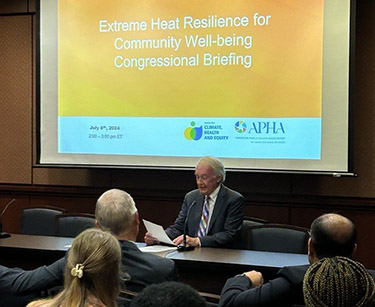This summer is shaping up to be another record-breaking one for extremely hot days, following record high temperatures in 2023. As temperatures continue to rise and heat waves become more frequent, it is increasingly important to prioritize the health and well-being of communities that inequitably bear the risks of extreme heat.
On Monday, July 8, APHA’s Center for Climate, Health and Equity cohosted a congressional briefing with the office of Sen. Edward Markey, D-MA, to highlight policy recommendations that can reduce and address the health impacts and risks of extreme heat in historically marginalized communities.
“Heat is an important health issue,” Katherine Catalano, MS, deputy director of the APHA Center for Climate, Health and Equity, said in her remarks. “We all need to work together to come up with equitable climate solutions for our communities.”
Communities of color, low-income communities, children, older adults and people with chronic illnesses experience some of the most severe health effects related to heat. Over 1,200 people in the U.S. die from extreme heat every year, according to the Centers for Disease Control and Prevention.
A panel of experts who spoke at the briefing said the federal government has an important role to play in supporting local extreme heat resilience interventions through funding, guidance, research and development, and other policies.
Policy recommendations include:
- Support the Preventing Health Emergencies and Temperature-related Illness and Deaths Act. The bill would provide $100 million in financial assistance for community projects to reduce exposure to extreme heat, as well as create the National Integrated Heat Health Information System Interagency Committee to address health risks posed by heat.
- Increase funding for CDC’s Climate and Health Program and fund the Office of Climate Change and Health Equity. APHA and other organizations active in climate and health urge Congress to increase funding for this program to $110 million for Fiscal Year 2025 to help states, cities, territories and tribes address local concerns about climate change.
- Transition federal infrastructure investments toward green, cool and pervious “smart surfaces.” Agencies should shift federal infrastructure investments away from dark, impermeable surfaces to “smart surfaces,” such as cool roofs and pavements and green stormwater infrastructure. Additionally, federal agencies should adopt the social cost of carbon provision published in the Environmental Protection Agency’s methane rule.
- Support the Extreme Heat Emergency Act of 2023. This bill would require the Federal Emergency Management Agency to classify extreme heat as a major disaster, which would allow states to make disaster declarations to access critical funding.
- Support occupational standards for workers exposed to extreme heat. The Occupational Safety and Health Administration is working on creating regulation to keep people who work outside safe from the dangers of heat.
- Support the Community Mental Wellness and Resilience Act. This bipartisan bill would establish a competitive grant program at CDC to create, operate or expand community-based programs that use a public health approach to build mental wellness and resilience.
Among the experts participating were Jairo Garcia, PhD, chief executive officer of Urban Climate Nexus; Amy Liebman, MPA, chief program officer for workers, environment and climate with the Migrant Clinicians Network; Douglas Melnick, chief sustainability officer with the city of San Antonio, Texas; and Bill Updike, program manager of the Smart Surfaces Coalition.
Photo caption: Sen. Edward Markey, D-MA, talks about extreme heat policies at a congressional briefing cohosted by APHA July 8. (Photo by Mary Stortstrom)